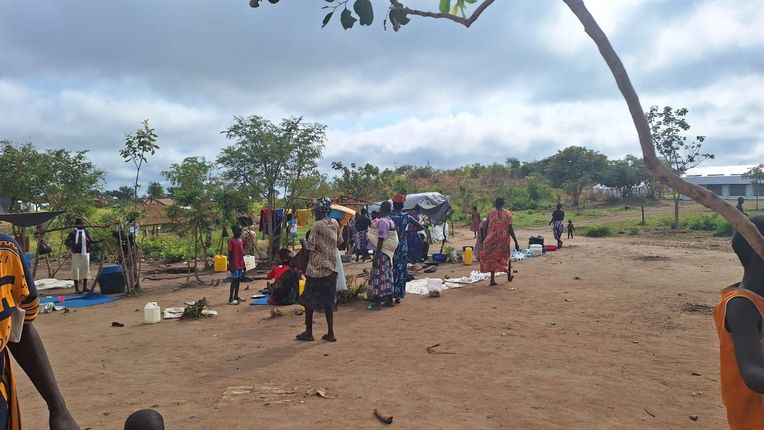
“The situation for refugees in Uganda has deteriorated dramatically.”
The view is impressive: the eye sweeps far across the bushland plain, with mountains rising in the background. However, the people in the new “Zone 8” of the Rhino Camp refugee settlement in north-western Uganda have little time to pay attention to the beauty of the scenery. They sit in small groups next to unfinished houses on the rocky hillside where they have been given land. A boy is trying to dig a vegetable patch with a hoe.
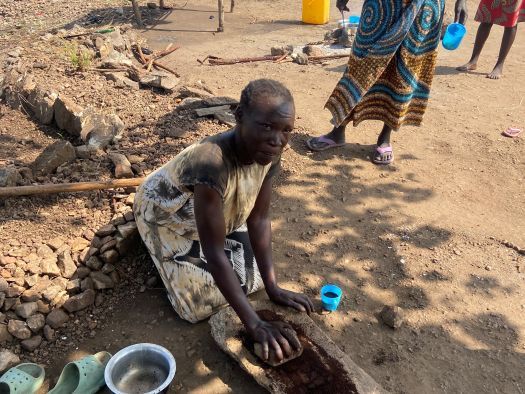
Serious concerns about the coming months
“The ground is too rocky; we can't grow anything here,” complains a group of women who have lit a fire in front of their makeshift house and are grinding coffee beans on a stone. They will have to travel long distances to grow food elsewhere.
Uganda is the most significant host nation for refugees on the African continent. Permission is granted for them to engage in labor, to move freely, and to receive a plot of land for the construction of shelters, latrines, and gardens. Since the opening of "Zone 8", which has a capacity of 60,000 refugees, in July, only 7,000 individuals have been settled there due to the lack of service in that new zone. The other new arrivals were settled in already overpopulated zones where service infrastructure is present but now under enormous strain.
Most of these individuals hail from South Sudan and the Democratic Republic of Congo, with some also originating from Sudan. The settlement is currently providing sanctuary for more than 150,000 individuals, predominantly women and children.
“Within a few months, the situation for the 1.9 million refugees who depend on humanitarian aid has deteriorated massively throughout the country,” reports Amandine Desaunay, Country Director of Malteser International in Uganda. She is concerned about the coming months.
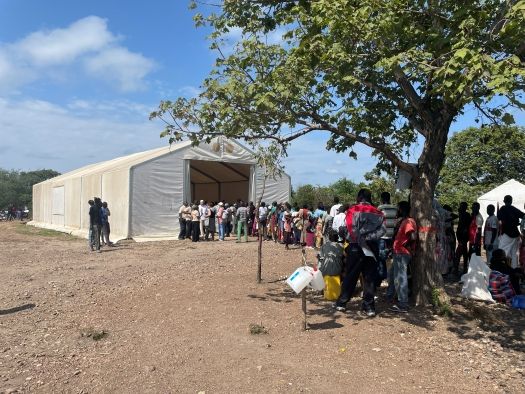
Basic care for refugees at risk
As part of wider budget cuts at the United Nations, the World Food Programme (WFP) has had to reduce the food rations provided for newly arrived refugees by 40 percent. The current consumption is 390 grams per person per day, primarily consisting of rice or corn, beans, and vegetables.
The people who have just arrived are still the lucky ones who receive this “full” ration. Following a three-month assessment period, the UNHCR will categorize individuals based on the severity of their needs, which may include factors such as family composition or health issues. Only those in the first two categories receive further cash distributions: 28,000 shillings per person per month for category 1 and 10,000 shillings (around 2.50 euros) for category 2.
Since May 2025, approximately one million individuals have been categorized as Category 3, resulting in their complete exclusion from the World Food Programme's suport. “When there is no more food, children stop going to school because the little money they have is spent on food. Health problems also increase. The consequences are already devastating,” reports Amandine.
Furthermore, there is no longer any budget remaining for other programs. Malteser International is responsible for the water supply for 50,000 people in Rhino Camp and has drilled a borehole in "Zone 8" to ensure that new arrivals have access to clean water. Due to the nature of the stony ground and the deep underground aquifer, it was necessary to obtain a separate expert opinion for this particular project. This aid is urgently needed, but there will be no more funding available from next year onwards. If the water systems are no longer maintained, they will at some point break down and become unusable, leaving thousands of refugees – in addition to facing all the other challenges – without access to clean water.
"For refugees, it means no or much less access to any health care, food and education, and inadequate water and sanitation services. It means they will have to choose between accepting to be abandoned to their own destiny or go back home to war zones," says Amandine. She believes that the ongoing conflicts in neighboring countries are likely to drive even more people to flee, which will then increase tensions in Uganda as well.
Building a future with the right support
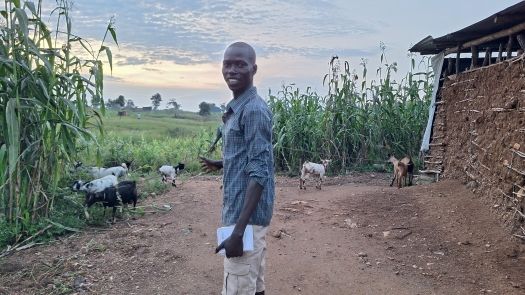
The longer-established settlements in Rhino Camp demonstrate what can be achieved with the right support. Traditional huts are nestled within lush gardens adorned with papaya trees bearing fruit. Some residents have cultivated vibrant flowerbeds in front of their homes, while small stables house goats and chickens. In the evening light, the settlements appear peaceful and idyllic.
Moses Yeka, aged 28, fled the conflict in Yei, South Sudan, in 2017. Having arrived with almost nothing, he now looks after six pigs, 16 goats and nearly 90 chickens. He is also the secretary of the Ngongi Tali Village Savings and Loan Association (VSLA), one of 20 groups in Rhino Camp that have received training in financial literacy, accounting, entrepreneurship and business skills from Malteser International.
The savings he accumulated through the group helped him to start a small farm and grocery store. Next year, he plans to sell more eggs, as they are hard to come by in Rhino Camp. He regularly sells his piglets and uses the income to ensure that his children receive a good education in the neighboring Koboko district. “I also want to buy land there. I want my children to have an easier life than I did,” he says.
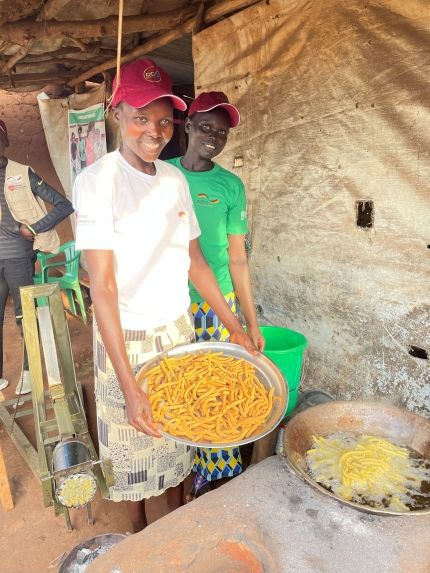
Starting a business to provide for the family
Jane Adare, aged 33, also was settled in Rhino Camp in Uganda from South Sudan. There, she is part of the innovation group of Kulika Uganda, a local partner organization with which Malteser International has been running the 'Creative Capacity Building' project in Rhino Camp since 2019.
During workshops, participants discuss their everyday challenges and develop technical solutions to help them build a business. Support is provided for implementation, as well as training in entrepreneurial skills such as business selection, marketing, pricing, and accounting.
Together with her 35-year-old business partner, Mary Kiden, she recognized the high demand for snacks in the region. Because people here often have to walk long distances, portable, ready-to-eat food is welcome to many.
The two women developed a press with which they produce 'Tamia', traditional soybean snacks, selling them for 500 shillings a bag (around 12 cents). The snack is usually rolled by hand, but the press enables the two women to produce and sell much more quickly and in greater quantities. They use their prototype for themselves, and three more presses are intended for sale.
Until now, Jane and Mary have been able to provide their families with the bare necessities from the money they earn from their business. But since food aid was cut, things have taken a turn for the worse for them, too. “People now have to spend all their money on basic necessities,” Jane reports.
Focus on closing the gaps in basic services
Thanks to the support they received, Moses, Jane, and Mary were able to build a future for themselves. But what will happen to those arriving today who will no longer receive this assistance? Two-thirds of refugees are women who often arrive in Uganda alone with several children. How are they supposed to feed their families and pay for their children's education on their own?
Malteser International will continue to provide vital support to these individuals through its local partner organizations, with a particular focus on addressing the gaps in basic health care and WASH (water, sanitation, hygiene) services that have been caused by budget cuts from public donors. Amandine: “Every euro counts and every bit of support is desperately needed!”
© Elena Becker, October 2025








